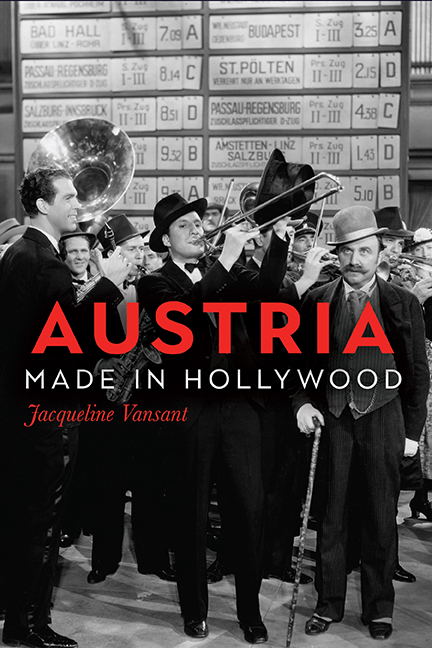Book contents
- Frontmatter
- Contents
- List of Illustrations
- Acknowledgments
- Introduction
- 1 Erich Stroheim, His Austria(ns), and Their US Contexts
- 2 Cross-Cultural Encounters of the Intimate Kind: Hollywood's Americans in Love with Austria(ns), 1932–60
- 3 The Empire Strikes Back: Imperial Austria Fights Nazis, 1938–41
- 4 Reflections and Refractions of the Anschluss on the Hollywood Screen, 1941–42
- 5 Confronting and Escaping History: The Cardinal (1963) and The Sound of Music (1965)
- Conclusion: Hollywood's Austria—Its Past, Present, Future
- Appendix: Hollywood Films Set in Austria
- Notes
- Bibliography
- Index
1 - Erich Stroheim, His Austria(ns), and Their US Contexts
Published online by Cambridge University Press: 04 April 2019
- Frontmatter
- Contents
- List of Illustrations
- Acknowledgments
- Introduction
- 1 Erich Stroheim, His Austria(ns), and Their US Contexts
- 2 Cross-Cultural Encounters of the Intimate Kind: Hollywood's Americans in Love with Austria(ns), 1932–60
- 3 The Empire Strikes Back: Imperial Austria Fights Nazis, 1938–41
- 4 Reflections and Refractions of the Anschluss on the Hollywood Screen, 1941–42
- 5 Confronting and Escaping History: The Cardinal (1963) and The Sound of Music (1965)
- Conclusion: Hollywood's Austria—Its Past, Present, Future
- Appendix: Hollywood Films Set in Austria
- Notes
- Bibliography
- Index
Summary
ERICH VON STROHEIM, the Viennese-born director/actor with a fictitious pedigree, introduced the Habsburg capital to the American screen in 1923 with Merry-Go-Round and revived prewar Vienna again in 1928 with The Wedding March. When he disembarked at Ellis Island in 1909, Erich Oswald Stroheim, born in 1885 to Jewish parents, reinvented himself as an Austrian aristocrat. Throughout his life, he varied the stories of his past in Austria, but in all of his personal fictions, he was an aristocrat who had been a high ranking officer serving Emperor Franz Josef in the army. Stroheim's confabulated past, which served him well in Hollywood, invited psychological interpretations of his two Vienna films. Richard Koszarski views Merry-Go-Round as a cathartic gesture that expressed the director's desire to deal with a society that excluded him. “In rebuilding Vienna, von Stroheim was not just outdoing De Mille or Griffith in details of realistic splendor. He was exorcising some of his deepest feelings, dredging up conflicts so intense that he no longer could keep them fully bottled up…. Whatever the truth of his days in Vienna, the ambiguities of Merry-Go-Round reveal a continuing internal struggle. He faced the fall of this dynasty with all the emotion of a true convert.” Along the same lines, Koszarski considers The Wedding March “a great, nostalgic homage to prewar Vienna.” In a similar vein, Arthur Lenning maintains that The Wedding March “allowed Stroheim to act the role of his dreams: an aristocratic rake in the doomed prewar Vienna of his youth. It was his greatest wish-fulfillment.” Frieda Grafe also explains how Stroheim's adopted persona and his directorial ambitions coincided. “By slipping on the uniform he turns himself into the leading man. With this act, the rejected, illegitimate son uses his own trade to appropriate that which had been denied him.” Stroheim's published remarks on his relationship to Vienna encouraged such interpretations that ignore the impact of domestic contexts on his films. In the rare examples when Merry-Go-Round and The Wedding March have been examined within the context of the Hollywood system, film scholars have focused on the director's personal battles with the studio bosses, which they viewed as emblematic of an industry in which commercialism so often wins out over artistic ambitions.
- Type
- Chapter
- Information
- Austria Made in Hollywood , pp. 23 - 38Publisher: Boydell & BrewerPrint publication year: 2019



